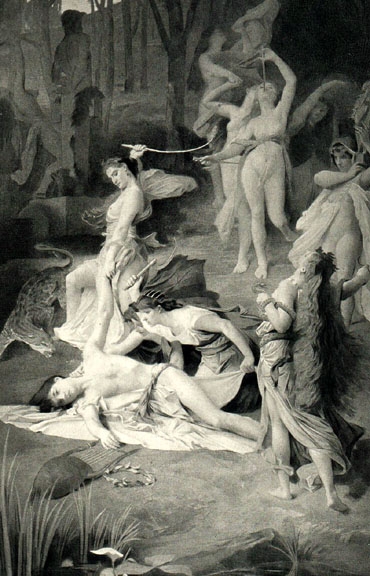
|
Orpheus |

|

|
Orpheus Slain By The Thracian Women by Emile Levy
|
Orpheus fell in love with Euridice, a young Thracian girl, who was known for her great beauty, and desired to marry her. At this time in Thrace, however, there was a wicked and orgiastic cult of women known as the Bacchantes, who worshiped Bacchus, god of wine and sensual pleasure. It is said that Hecate, goddess of the moon, had designs for Euridice, whom she desired as a Bacchante because of her great beauty and cast a spell on her. Orpheus intervened, broke the spell with the power of his song, and was wed that night to Euridice, whom he loved passionately and above all else. His bliss, however, was to be short lived. Aristaeus, a Thracian who desired Euridice for his own, was placed under a spell by Hecate and plotted to steal Euridice from Orpheus by force. While fleeing from Aristaeus, Euridice stepped on a serpent hidden in the grass and was bitten, whereupon she died. Orpheus was overcome with grief at the death of his Euridice, and wandered aimlessly in the forest for days, singing his lament to the mournful plaint of his lyre. Unable to reconcile his grief, he resolved to journey to the underworld to bargain with Pluto for her release. Orpheus entered the Underworld by way of a cave entrance and charmed the very shades of Hades with his lyre. Tantalus forgot for a moment his eternal thirst; Ixion's wheel stopped; and Sisiphus rested on his stone. Even the terrible Furies were overcome by the mournful strains of Orpheus' lyre, and their cheeks were for the first time dampened with tears of sorrow. Such was the power of the music of Orpheus that neither Persephone, queen of the underworld nor the mighty and inexorable Pluto could refuse Orpheus' request. Orpheus' plea for the release of his Euridice from the caverns of Hades was granted to him on the condition that he depart from the Underworld without looking back, assured by faith of his love that Euridice would follow him. Should Orpheus but once falter and look back, Euridice would forever be lost to him. Tormented by the voice of doubt and the desire of his love, Orpheus faltered and turned to catch a glimpse of his beloved, to see if truly she followed him. In so doing, he violated the condition of Pluto, and to his horror, saw Euridice vanish into the mists of Hades, lost to him forever. So overcome by his grief was Orpheus that he wished for death and wandered once more among the beasts of the forest, lamenting in torment the loss of his beloved. He spurned all human contact, and longed to be made one with the gods, to be released from his suffering in the weary, sorrowful circle of life. Orpheus was overtaken in the forest by a band of Thracians, already reveling under the influence of wine. They attempted to convince him to join them in the base and impure delights of their festival of the night. When Orpheus spurned their offers, the Thracians flew into a great rage and attacked him. Orpheus was slain, and the Thracians tore him apart and scattered his limbs. His head was cast into the River Hebrus, still singing the name of his beloved Euridice. It floated to the island of Lesbos where it was retrieved by the Muses and buried in the sanctuary of the island where it became an oracle that was so powerful that it rivaled the Oracle of Apollo at Delphi. His limbs were also gathered up by the Muses and buried in a tomb at the foot of Mount Olympus, where, it is said today, the nightingales sing more beautifully than anywhere else. |
Thank you for visiting Orpheus.
Your comments will be greatly appreciated.


This page was first presented on the World Wide Web on 21 November, 1998.
This page was last updated on 2 January, 2004, Lefkosia, Cyprus.
© 1998-2004 Tefkros Symeonides
Sources : The above excellent account of the tale of Orpheus is from Brian D. Berlin's website www.76trombones.org.
This counter was initiated on 2 January, 2004.